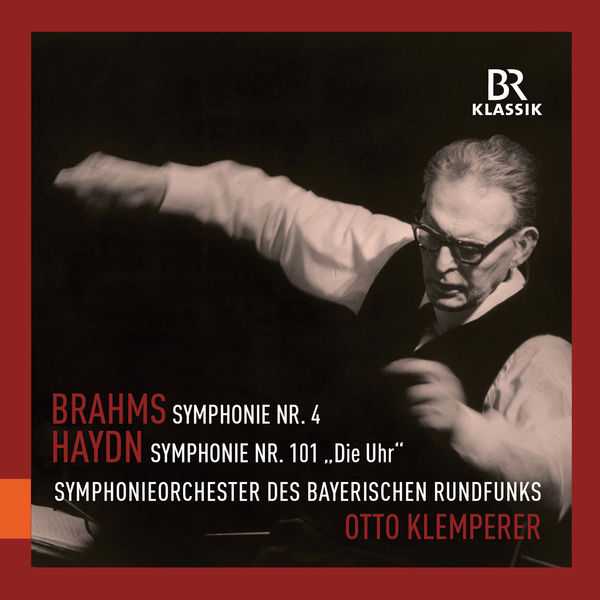

Composer: Johannes Brahms, Franz Joseph Haydn
Orchestra: Symphonieorchester des Bayerischen Rundfunks
Conductor: Otto Klemperer
Format: FLAC (tracks)
Label: BR Klassik
Catalogue: 900717
Release: 2019
Size: 1.3 GB
Recovery: +3%
Scan: yes
Haydn: Symphony No. 101 in D major ‘The Clock’
01. Adagio – Presto
02. Andante
03. Menuetto. Allegretto
04. Finale. Vivace
Brahms: Symphony No. 4 in E minor, Op. 98
05. Allegro non troppo
06. Andante moderato
07. Allegro giocoso – Poco meno presto – Tempo I
08. Allegro energico e passionato – Piú Allegro
Otto Klemperer was one of the most important German conductors of the 20th century. After his return from emigration he guestconducted some of the most important orchestras in Germany including the Symphonieorchester des Bayerischen Rundfunks. He did not assume the position of Chief Conductor in his homeland again, however: he felt estranged and alienated from postwar Germany, and this was compounded by his advanced age and poor health. In April 1956, Klemperer conducted the Symphonieorchester des Bayerischen Rundfunks for the very first time the debut of a man who was almost 71 years old. Up to May 1969, he would conduct a total of eleven evening concerts in Munich. The audiences were always just as delighted as the critics. The latter emphasized the “utmost perfection” of his interpretations and were aware that, due to the conductors advanced age and state of health, the Munich concerts bore “the seal of the unrepeatable”, and that “those fortunate enough to hear these concerts will remember them all their lives”.
These concert recordings give the lie in stunning style to the reputation for slowness which has dogged the great Otto Klemperer. The image of a partially-paralysed old man directing Beethoven’s symphonies at a deathly slow pace is dispelled by these two concert versions of Symphony No.101 “The Clock” by Haydn and Symphony No.4 by Brahms recorded in Munich in 1956 and 1957, with the excellent Bavarian Radio Symphony Orchestra, one of Germany’s best.
Here is a perfectly-balanced Haydn, both biting and joyful. The opening Presto launches with sparkling élan, and sets the tone for the whole album. It reminds us how, in his youth, Otto Klemperer had always been a conductor ready to take to the barricades for contemporary music, and to play the great works of the repertoire with a style whose grandeur was only rivalled by its vivacity.
His vision of the Fourth Symphony by Brahms alternates between a sense of immensity (Allegro giocoso) and a versatility in terms of tempo that most conductors today wouldn’t dare tackle. He cleverly structures the Finale, to underscore the thread linking Brahms and the contrapuntists of musical history, the crowning summit of which writing being a Bach cantata and the use of a passacaglia that holds together the whole magisterial performance. Starting at a relatively moderate tempo, the movement reaches its climax, as Brahms instructs on the score (Più Allegro), in a fateful and liberating whirlwind.